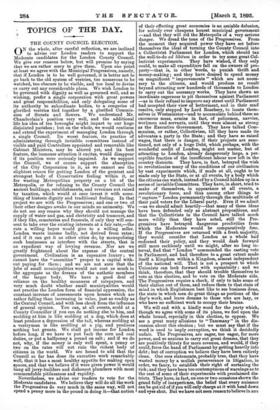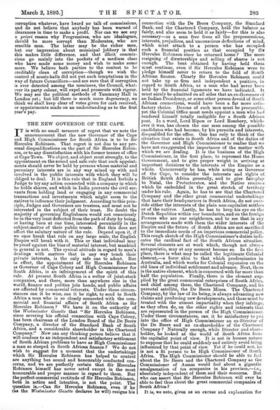• TOPICS OF THE DAY.
THE COUNTY COUNCIL ELECTION.
ON the whole, after careful reflection, we are inclined to advise our London readers to support the Moderate candidates for the London County Council. We give our reasons below, but will premise by saying that we are rather sorry to give them. Upon one point at least we agree with the Municipal Progressives, namely, that if London is to be well governed, it is better not to go back to the old system of vestries, too numerous to be watched, too obscure to be visible, and too local to devise or carry out any considerable plans. We wish London to be governed with dignity as well as governed well, and so wishing, prefer a single corporation with great powers and great responsibilities, and only delegating some of its authority to subordinate bodies, to a congeries of glorified vestries tied together by a glorified Commis- sion of Streets and Sewers. We understand Mr. Chamberlain's position very well, and the additional life his idea of ten boroughs might impart to our huge disjointed parishes ; but on the whole, we would continue and extend the experiment of managing London through a single Council. Its worst feature, its practice of administering through invisible committees instead of visible and paid Controllers appointed and removable like Cabinet Ministers, may be altered yet, and its best feature, the immense attention it excites, would disappear if its position were seriously impaired. As we support the Council, we of course support the absorption of the City Corporation in it, as we cannot see the slightest reason for gutting London of the greatest and strongest body of Conservative feeling within it, or for wasting Metropolitan property on a bit of the Metropolis, or for refusing to the County Council the ancient buildings, establishments, and revenues not raised by taxation, which would at once invest it with some- thing of historic dignity and traditional feeling. In that project we are with the Progressives ; and one or two of their other designs awake in our minds no animosity. We do not see any reason why they should not manage the supply of water and gas, and electricity and tramcars, and if they like, cemeteries and funerals, if only they will con- sent to take over the existing interests at a fair rate,—the rate a willing buyer would give to a willing seller. London wants income badly, not derived from rates ; and if it can get it as other cities do, by monopolising such businesses as interfere with the streets, that is an expedient way of levying revenue. Nor are we greatly frightened about the expense of the central government. Civilisation is an expensive luxury ; we cannot have the " amenities " proper to a capital with- out paying for them ; and we are not sure that the jobs of small municipalities would not cost as much in the aggregate as the dreams of the aesthetic members of the larger body. We have a good deal of reliance on the healthy meanness of ratepayers, and very much doubt whether small municipalities would not practise the London form of financial oppression, the constant increase of assessments upon houses which are rather falling than increasing in value, just as readily as the Central Council, and with less check from the influence of general opinion. You can, at all events, scold at a County Councillor if you can do nothing else to him, and scolding at him is like scolding at a dog, which does at least produce a depression of the tail, whereas scolding at a vestryman is like scolding at a pig, and produces nothing but grunts. We shall get income for London before long, if we have to put back the corn and coal duties, or put a halfpenny a pound on salt ; and if we do not, why, if the money is only well spent, a penny or two on the rates will not ruin the richest body of citizens in the world. We are bound to add that the Council so far has done its executive work remarkably well, that it has a most healthy appetite for making open spaces, and that we believe if it were given power it would hang all jerry-builders and dishonest plumbers with most commendable pitilessness and rapidity. Nevertheless, we advise our readers to vote for the Moderate candidates. We believe they will do all the work the Progressives do very much in the same way, will not spend a. penny more in the pound in doing it—that notion of their effecting great economies is an amiable delusion, for nobody ever cheapens honest municipal government —and that they will rid the Metropolis of a very serious danger. We dread the tone of the Progressives. From the moment they acquired power they have set before themselves the ideal of turning the County Council into- a Collectivist Parliament for London, which should tax the well-to-do ad libitum in order to try some great Col- lectivist experiments. They have wished, if they only could, to make all expenditure fall on the owners of pro- perty—that is, in other *words, to punish thrift and money-making ; and they have desired to spend money on magnificent " improvements " which are not neces- sary to the citizens, and would produce no result beyond attracting new hundreds of thousands to London to carry out the necessary works. They have shown an inordinate eagerness to pit themselves against Parliament —as in their refusal to improve any street until Parliament had accepted their view of betterment, and in their mad resolve, only stopped by Lord Rosebery, to locate them- selves in Westminster—and to accumulate behind them an enormous mass, armies in fact, of policemen, navvies, workmen and servants, until they were almost as strong as the Executive Government. They have talked Com- munism, or rather, Collectivism, till they have made its advocates a party in the State ; and they have so raised wages, that there is danger, if their projects are sanc- tioned, not only of a huge Debt, which perhaps, with the wonderful credit of London, might not matter, but of attracting to London, already dangerously large, a per- ceptible fraction of the insufficient labour now left in the country districts. They have, in fact, betrayed the wish to revolutionise many of the conditions of our civilisation by vast experiments which, if made at all, ought to be- made only by the State, or at all events, by a body which the citizens can watch, instead of by a Council hidden up in a,. series of invisible Committees. They have, in short, tried to make of themselves, in appearance at all events, a revolutionary force, and thus among other things to " capture " London permanently through the multitude of their paid voters for the Liberal party. Even if we admit —as we should admit heartily—that many of these ideas have been defended only as abstract propositions, and that the Collectivists in the Council have talked much more wildly than they have acted, still the Pro- gressives have betrayed dangerous proclivities from which the Moderates would be comparatively free. If the Progressives are returned with a fresh majority, they would consider that London as a whole had endorsed their policy, and they would dash forward still more recklessly until we might, after no long in- terval, find that " London " commanded the casting vote- in Parliament, and had therefore to a great extent made itself a Kingdom within a Kingdom, almost independent of the national will. That is not a prospect to which Unionists can look forward with equanimity ; and we think, therefore, that they should trouble themselves to vote at this election, and to vote on the Moderate side. The Progressives require a check, if only to take some of their elation out of them, and reduce them to that state of mind in which Englishmen best like to see business done, the state in which men do great things as portions of the day's work, and leave dreams to those who are lazy, or who have no sufficient work to occupy their brains.
We will end with a kindly word for the party which, though we agree with some of its plans, we feel upon the whole bound, especially in this election, to oppose. We see a great many allusions to " Tammany " in the dis- cussion about this election ; but we must say that if the word, is used to imply corruption, we think it decidedly unfair. The Progressives. are eager, too eager, for more power, and so anxious to carry out great dreams, that they are positively thirsty for more revenue, and would, if they could, force the hand of Parliament by getting heavily into debt ; but of corruption we believe they have been entirely clean. One sees statements, probably true, that they have wasted money by a mulish perseverance in litigation, in order, we fancy, to establish their right of surtaxing the rich ; and they have been too contemptuous of warnings as to the cost of some of their experiments with proclaimed dis- tricts. They have, in fact, on one or two occasions shown the grand folly of inexperience, the belief that every nuisance can be got rid of if you will only charge at it with head down and eyes shut. But we have not seen reasontobelieve in any corruption whatever, have heard no talk of commissions, and do not believe that anybody has been warned of clearances in time to make a profit. Nor can we see any z priori reason why Progressives, who are ideologues, should be more corrupt than Moderates, who are sensible men. The latter may be the richer men, but our impression about municipal jobbery is that this makes little difference, and that illicit commis- sions go mainly into the pockets of a medium class who have made some money and wish to make some more. We believe both parties to the contest to be creditably clean of corruption—though we wish the control of music-halls did not put such temptations in the way of future Councillors—and are sure that if corruption is ever detected among the nominees, the Council, what- ever its party colour, will expel and prosecute with rigour. We may see the political methods of Tammany Hall in London yet ; but till there is much more degeneracy, we think we shall keep clear of votes given for cash received, or appointments made on an understanding as to the first year's pay.



































 Previous page
Previous page